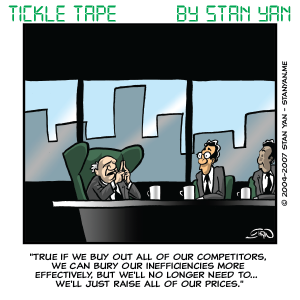In a classic study in psychology, Dr Robert Zajonc discovered that people are often influenced by subconscious thoughts outside their awareness. He showed people pictures and objects without their conscious knowledge. When he later asked them to report their preferences, they chose stimuli they had seen previously. Merely seeing an object in the recent past can impact your preferences.
Why do you want to invest in a particular company? Is it because you have done a thorough analysis? Or perhaps it is merely because you saw a slew of television commercials touting its products as new and innovative while you were getting ready to go to bed. It does seem hard to believe at first glance, but many of your decisions may reflect irrational subconscious processes.
Dr Hans-Peter Erb of the University of Bonn has shown that people’s economic decisions are often influenced by factors that are below their awareness (Erb, Bioy, & Hilton, 2002). In an experimental study, participants were asked to make a decision after completing an unrelated task. Feelings elicited from the first task impacted subsequent decisions about risk. These findings illustrate how people may be willing to take a risk as a result of subconscious feelings.
It’s hard to not be impacted by images and feelings that enter our consciousness without knowing it. Humans have a natural affinity to attach emotional significance to inanimate objects, like stocks. It is helpful most of the time. When you hear about a product or services failing to perform at par, such as a new computer running too hot or an airline that tends to arrive late and misplace luggage, you instinctively try to avoid such companies in your personal life. You may similarly avoid the supermarket that fails to store its raw meat properly or the drug store that sells over-the-counter medications with expiration dates that end within a week. We feel uneasy when we experience such events in our everyday lives.
Avoiding products and businesses that don’t meet our expectations is a useful rule of thumb. Unfortunately, the same processes also work for pleasant events. When we see an attractive model of a car that everyone is buying, we tend to want to get one for ourselves. We will even ignore poor gas mileage if it is in fashion, and “everyone” is buying one. We carry these subconscious processes into our trading life. We may “feel” good about a stock, and buy it because of these feelings. We may take unnecessary risks because we have a hunch that the stock will go up. Sometimes our hunches are based on a rapid, astute analysis of existing data, but at other times, they merely reflect irrational subconscious preferences.
How can you beat your subconscious? Don’t underestimate its significance. You aren’t a slave to influences below your awareness, but you aren’t immune to them either. You may make a decision based on nothing more than an amorphous feeling that has no basis in fact. Working from your intuition is essential in the fast-paced world of trading, but always remember that a hunch should be based on specific pieces of evidence. Before jumping into a trade too quickly, it’s worth being a little sceptical. Try to reconstruct the information that you used subconsciously to arrive at your trading decision. If nothing comes to mind, you might be better off rethinking your decision. Don’t let your subconscious throw you off. If you acknowledge the power of your subconscious, you will go far in stopping it from basing your decisions.


